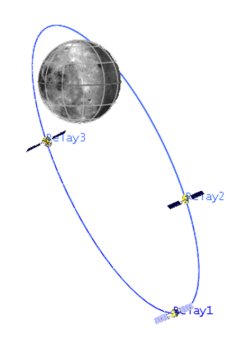I don't think there are any in the Solar system. We do have around 250 asteroids with moons. Rhea's ring seems to be the only exception.
Edit: originallyEdit: Originally I said "a moon with a moon would be an unstable system, due to the gravitational influence of the planet"planet." @Florian disagrees with this. However, the answer is more complex than the Hill sphere alone.
At first approximation, the Hill sphere gives a radius in which orbits around a moon could be stable. Our Moon's Hill radius is 64000 km.
For
For our own Moon, we know that most low orbits are unstable due to mascons: mass concentrations below the surface which make the Moon's gravitational field noticeably uneven. There are only four inclinations where an object orbiting the Moon avoids all mascons and would be stable: 27º, 50º, 76º, and 86º.
High orbits above the Moon aren't all safe either: above 1200 km and inclinations of more than 39.6º, Earth's gravity disrupts the satellite's orbit. Note that these orbits are comfortably within the Moon's Hill sphere.
There
There are stable orbits at high inclinations and high eccentricity:

As
As for other moons in the solar system: most of them are smaller and orbit around larger planets, so their Hill spheres are small, and the planet's gravity will disrupt much of the volume inside the Hill sphere too.
Moons
Moons below the limit where their gravity is strong enough to make them spherical, will have problems with uneven gravitational fields. Mascons may also be present.